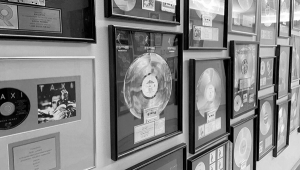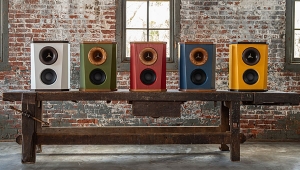| Columns Retired Columns & Blogs |
The Music Goes Round & Round Page 4
I listened to one of our sales guys talking about product to a guy who came in the room, and he did the same thing we accuse the magazines of doing. Before he's told the guy what it is, or what we built it for, or what we think people could possibly use this thing for, he's into talking about the material, the platter and the bearing, things that I feel we should get away from. Now we've never published specifications on our products, but that doesn't mean we don't have any. I think that the whole industry can get into this loop, when you've got the customer saying "Should I buy this or not?" "This one's got 14 integrated cirucits and this one only 3." "If that wasn't a 4 ohm speaker, what would its efficiency be if it were an 8 ohm speaker, and how many watts has it got?" That's the real world we've got out there.
Riendau: But who brought that kind of attitude?
Tiefenbrun: We did!
Riendau: Didn't the Japanese start to come out with impressive numbers so they could distract people's attention from what was better in order to talk them into buying their numbers? That's really the only thing that they could back up their equipment with—numbers.
Larry Archibald: I think that it comes from people's insecurity about what it is that they're buying. People yearn for something that will identify and characterize the equipment they're buying, and that's why numbers are useful. People use acceleration figures, they use all kinds of things to describe cars, and it helps them.
Riendau: At least they're relevant. 0-to-60 tells me something.
Tiefenbrun: It tells you they've rigged all the gearbox ratios to produce a good mileage figure . . .
Brennan: They're like super-low distortion figures; they don't have anything to do with good sound quality.
Tiefenbrun: I've always said about specifications that they're all meaningless. First, because no engineer can tell what anything sounds like by reading the specs. The other thing is that specifications are always best when the equipment is not working—when it's switched off! You have no distortion, no rumble, no crosstalk, no wow & flutter, etc. You don't have to be a genius to figure out that there's something stupid there. The specifications are an attempt to describe something with numbers or words which you can't really do. The whole point of music is that it's a language of feeling and emotion, it says things in a language that you cannot say in words. And that's the problem we have with hi-fi. You can't really describe what the equipment does to the music with words either. So we all end up talking gobbledegook.
How can you describe a sound in words? It's like Charlie says, you can't sing about football—even Beethoven couldn't do a good job. You have all these senses . . .
Brennan: . . . and the appropriate one is to go and listen to something!
Atkinson: But then you have to have a dealer . . .
Tiefenbrun: . . . who will let the customer hear the product!
Brennan: In a sense, you're letting the customer off the hook with a good review.
Herman: It makes it very easy for the dealer.
Brennan: He will order a product because there's a good review coming up, and it then sell on the back of the review. That doesn't actually help anybody, as the product is then only as good as its last review.
Herman: It gets most dangerous when the press make their own language; then nobody knows what they mean. It was very interesting that when an Editor recently created a new description, his entire staff started using this new word. At a general meeting of the entire congregation of the magazine, one reviewer asked all the others in turn what they thought this word meant. And they all had a different perception . . .
Tiefenbrun: For God's sake, no-one knows what "dynamic range" means.
Herman: . . . and none of them agreed with the Editor's definition! The word was "transparency." What we've got here is a type of insanity, because when you create your own language you can't be challenged.
Tiefenbrun: But a magazine is about communication, so what's the point of using words that nobody understands? If the purpose of words is to convey meaning, then in the hi-fi industry we do a great job very, very badly. I occasionally read a review and go into fits of laughter, because it's just so ridiculous. But you've got to remember that we all got into this game because we were enthusiasts. I can remember reading reviews and thinking "What does he really mean? Does Angus McKenzie of Hi-Fi News really think I should buy this or not?" I had John Gilbert of Gramophone magazine in my room yesterday, and I played him two turntables. He heard a difference, and said "That's enormous, that difference." Now that's probably the first time John Gilbert actually had a turntable demoed to him. People are out there buying records and hi-fi systems, but they don't know what our industry's trying to do. They don't know what it has to offer them, and we're not explaining it very well. They go into a dealer's and the whole experience is pretty awful—they know the minute they step in the shop that they've made a big mistake. The whole atmosphere's wrong.
- Log in or register to post comments




































